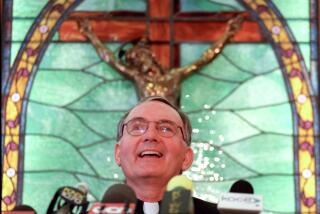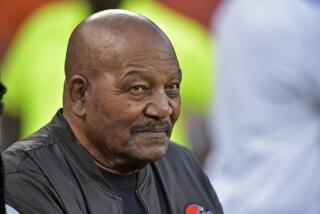Jerry Brown Comes Home With Plea for Bangladesh
- Share via
Former Gov. Edmund G. Brown Jr., just back from a week in flood-stricken Bangladesh, appealed Tuesday for Californians to give more to ease suffering there, particularly among malnourished youngsters.
On his trip to the densely populated country on the Asian subcontinent, Brown traveled by boat with CARE officials into some of the worst-hit areas and distributed 9-pound sacks of rice, lentils, molasses, water purifiers and matches.
The food was donated by the U.S. government, but other items are paid for by CARE and distribution is arranged by a large CARE organization in place in Bangladesh, Brown said. Altogether, $65 million in aid will be provided there under the auspices of the organization this year.
The former governor told of being moved on one occasion during his trip by the sight of a woman and four children in a hut surrounded by water that had risen to only inches below the floor. He said the only food they had was what the boat he was on had been able to deliver.
“Millions and millions of people eat one inadequate meal a day,” Brown said. “In Bangladesh, the kids look like they’re out of Buchenwald. Twenty-five percent of them die before they are 5.”
He said the main causes of child mortality are diarrhea, malnutrition, cholera and tetanus. Most children go unvaccinated.
This was the second trip Brown has made to the subcontinent this year. On the first trip, he visited Mother Teresa in Calcutta. “But the kids in Calcutta looked healthier,” he said. “The gap between the United States and Bangladesh is almost unbelievable.”
Nonetheless, Brown said, he had been impressed with the vitality of many of the people he met. “There is a courage, an indomitable quality. One cannot help to admire their spirit.”
Brown said that a key element of CARE’s program is a “food for work” exchange in which many of the recipients are expected to pitch in to improve a flood embankment or strengthen an irrigation system before getting food packages.
“A few dollars will go a long way to feed people there,” Brown said. He noted that the annual per-capita income in Bangladesh is $70.
Richard Hoff, CARE’s regional director, said Southern Californians have given nearly $1.5 million to the organization in the last year. Gifts sent to the CARE regional office at 8354 Beverly Blvd., Los Angeles 90048, can be specially designated for Bangladesh relief, he said.
While in the Bangladesh capital of Dacca, Brown said, he had met the country’s president, Lt. Gen. Hussain Mohammad Ershad.
Ershad told him of hopes that the United States could assist with needed flood control projects in neighboring India and Nepal that would reduce periodic flooding in his low-lying country, Brown said.
Brown added that there are rays of hope in Bangladesh’s situation. “Basically, the country is earning foreign exchange,” he said, “and is welcoming foreign investment. The jute, garment and shrimp industries are growing, and there is optimism that productivity can be doubled.”
More to Read
Sign up for Essential California
The most important California stories and recommendations in your inbox every morning.
You may occasionally receive promotional content from the Los Angeles Times.













